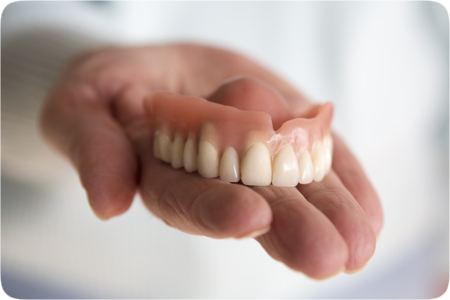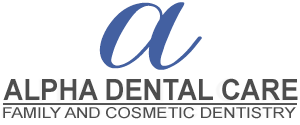Dentures
What is a denture?
Dentures are removable artificial teeth that are inserted in place of missing natural ones. The technique has come a long way toward reaching its current level. Today, there are various types of dentures made of high quality lasting materials. Modern dentures perfectly imitate lost teeth and bring back the original appearance, to say nothing of the functional side of it. Missing teeth can pose serious danger to your digestive tract, as well as other systems and organs. Unfortunately, lost permanent teeth will never be replaced naturally. If you have lost a large portion of teeth, look for a good dental prosthetist immediately and choose the best prosthesis option you can afford.
Types of dentures
Dentures are custom-crafted and installed by trained dental prosthetists. There are several types of dentures.
Partial dentures should replace several missing teeth, and they are held by remaining natural teeth. Mostly, they rest on an acrylic gum-like support.
Full dentures are used when there are no natural teeth left either on the lower or upper jaw.
Overdentures are an advanced type of dentures that requires an implantation surgery. There are both full and partial overdentures.
When are they used?
Partial dentures are applied when only a group of teeth are missing. In this case, using a well-fitting denture is a great way to fill in the gap. A partial denture may be attached to natural teeth with a clasp. Also, it is possible to fix a denture on the crowns of adjacent natural teeth.
Full dentures are used in cases when the entire row of teeth is missing. Upper dentures feature a tissue-colored base, which covers the gums and palate; lower full dentures are horseshoe-shaped. Prior to fixing a full denture, all remaining teeth and roots must be removed.
Overdentures rest on implants that are set into the jawbone. This appears to be the most reliable tooth replacement technique, because the implants are fixed pretty much like natural teeth. This kind of surgery requires proper oral care, and there should be no gum issues or any other oral diseases.
How to care for dentures
A number of steps should be taken to avoid health issues and prolong a denture’s life. It should be kept clean all the time. Just brush it as you used to brush your natural teeth. Use a soft toothbrush. Toothpaste is not advisable, because it is abrasive and may cause the crowns and the flesh-imitating portion to wear down too early.
There are cleaning agents and ultrasonic cleaners. When not wearing a denture, it should be placed into a cleaning solution or water. Drying can result in deformations.
Stay in touch!
If you have had a denture fixed, please, keep in touch with your dentist. Your jaws will change with age, and, most likely, a denture will stop fitting well one day. It may suddenly feel too tight or, vice versa, loose. If that is the case, the denture has to be repaired or replaced.
If you have damaged your denture, please, do not try to repair it yourself. If you do, you may bend or break the base or clasp. Contact your dentist immediately! Make sure that your denture fits perfectly. If not, you may end up with painful sores.
Contraindications
Generally, there are no contraindications to dentures, full or partial, except cases whereby patients are allergic to materials, of which they are made. Full dentures may not be good for people with a pronounced gag reflex.
Overdentures can be contraindicated for patients with oral diseases, weak jawbone, and cancer. Any implantation requires a full mouth debridement and can be carried out only if there are no oral problems.
Whether you have dentures or are considering them for the first time you want the best pair of dentures you can get in Milton at Alpha Dentistry - includes full mouth rehabilitation, which may call for implant supported dentures.
Alternately, traditional dentures include incredible detail. By including as much precision as possible, we offer the best Milton dentistry possible to patients looking for a natural looking and feeling tooth replacement. Call our office today at 905-876-0200 to explore your tooth replacement options. At Alpha Dental Care Milton, excellent dentistry involves preventative care, patient education and effective restorative care.
